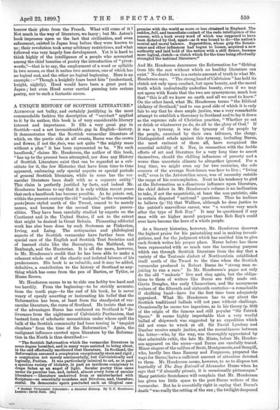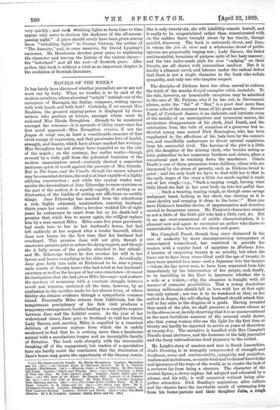A UNIQUE HISTORY OF SCOTTISH LITERATURE.* ALTHOUGH not bulky, and
certainly justifying in the most commendable fashion the description of " succinct " applied to it by its author, this book is of very considerable literary interest and importance. It fills a very great gap in Scottish—and a not inconsiderable gap in English—history.
It demonstrates that the Scottish vernacular literature of which, on the poetic side at all events, Burns was the crown and flower, if not the finis, was not quite "the mighty maze without a plan" it has been represented to be. "No such handbook," claims Mr. Henderson, the author of this book, "has up to the present been attempted, nor does any History of Scottish Literature exist that can be regarded as a sub- stitute for it, the few Histories that have from time to time appeared, embracing only special aspects or special periods of general Scottish literature, while in none has the ver- nacular literature been dealt with as a separate entity." This claim is perfectly justified by facts, and indeed Mr.
Henderson hastens to say that it is only within recent years that such a handbook has become possible. As he points out, within the present century the old " makaris," as the vernasular poets were styled north of the Tweed, ceased to be merely names, and became for the second time poetic person- alities. They have been carefully studied by experts on the Continent and in the United States, if not to the extent that might be desired in Great Britain. Pioneering editorial work has also been done by such Scotsmen as Pinkerton, Irving, and Laing. The antiquarian and philological aspects Of the Scottish vernacular have further been the special care of the English and Scottish Text Societies and of learned clubs like the Bannatyne, the Maitland, the Roxburgh, and the Hunterian. It is all the more, however, to Mr. Henderson's credit that he has been able to make a coherent whole out of the chaotic and isolated labours of his predecessors. His book is as valuable, and it may be added, definitive, a contribution to the history of Scotland as any- thing which has come from the pen of Burton, or Tytler, or Hume Brown.
Mr. Henderson seems to us to ride one hobby too hard and too harshly. From the beginning—to be strictly accurate, from the tenth page—to the end of his book, he is never weary of openly asserting or insinuating his belief that the Reformation has been, at least from the standpoint of ver- nacular literature, the curse of Scotland. He insists that one of the advantages Burns has conferred on Scotland is "de- liverance from the nightmare of Calvinistic Puritanism, that bastard form of scholastic monasticism under whose spell the bulk of the Scottish community had been tossing in 'unquiet slumbers' from the time of the Reformation." Again, the malignant influence exerted upon literature by the Reforma- tion in the North is thus described :— " The Scottish Reformation which the vernacular literature in some degree heralded, and in many ways assisted to bring about, in the end effectually smothered that literature. In Scotland, the Reformation assumed a complexion exceptionally stern and rigid ; a complexion not merely sentimentally, but Calvinistically and logically, Puritan. It was particularly inimical to art, as in part a specious variety of idolatry, in part an insidious conspiracy to drape Satan as an angel of light. Secular poetry thus came under its peculiar ban, and, indeed, almost every form of secular literature — literature underived from or nninterlarded with Scripture—as essentially mundane and frivolous, and, therefore, sinful. Its democratic spirit precluded such an illogical com.
• ScoUish Vernacular Literature: a Succinct History. By T. F. Henderson. London; David Nutt. [6s.] promise with the world as more or less obtained in England. The sudden, full, and immediate contact of the rude intelligence of the masses, with a book every word of which was supposed to have been dictated by God, upset—as it was bound to do—the nation's mental and moral balance. Superstition, whose grip the Renais- sance and other influences had begun to loosen, acquired a new authority and laid hold of the nation with a still firmer, because more logical, clutch—a clutch which for the time being effectually strangled the national literature."
And Mr. Henderson denounces the Reformation for "filching from life the zest without which no healthy literature can exist." No doubt there is a certain amount of truth in what Mr. Henderson says. "The strong hand of Calvinism" has held its clutch not only upon conduct, but upon beauty, and the moral truth which undoubtedly underlies beauty, even if we may not agree with Keats that the two are synonymous, much less that "this is all we know on earth and all we need to know." On the other hand, what Mr. Henderson terms "the Biblical idolatry of Scotland," and to one good side of which it is only fair to say that he does ample justice, was a very remarkable attempt to establish a theocracy in Scotland and to lay it down as the supreme rule of Christian practice, "Whether ye eat or drink or whatsoever ye do, do all to the glory of God." If it was a tyranny, it was the tyranny of the people by the people, exercised by their own tribunes, the clergy. Distinguished rebels against this tyranny, including Burns, the most eminent of them all, have recognised the essential nobility of it. Nor, in connection with the feeble efforts of art and literature for a very long time to assert themselves, should the chilling influences of poverty and a worse than uncertain climate be altogether ignored. For a long time, we might even say for two centuries, the sole concern of the average Scot,chman was how to live ; "living well," even in the Aristotelian sense, was of necessity outside the range of his contemplation. Next to his tendency to gird at the Reformation as a disastrous influence upon literature, the chief defect in Mr. Henderson's volume is an inclination to take, if not the unpatriotic, at least the non-patriotic, side in certain disputed " national " questions. Thus he inclines to believe (p.175) that Wallace, although he does justice to the patriot's marvellous career, was "a warrior very much after the type of Rob Roy." It may be questioned if any man with no higher moral purpose than Rob Roy's could ever have become the hero of a whole people.
As a literary historian, however, Mr. Henderson deserves the highest praise for his painstaking zeal in making investi- gations, and for the judgment which has enabled him to give each Scotch writer his proper place. Never before has there been represented with so much care the increasing purpose which ran through Scottish literature from the day that a variety of the Teutonic dialect of Northumbria established itself north of the Tweed to the time when the Scottish vernacular produced in Robert Burns its "strong man re- joicing to run a race." In Mr. Henderson's pages not only do the old " makaris " live and sing again, but the obliga- tions to them of writers like Burns are fully made out. Gavin Douglas, the early Chaucerians, and the anonymous writers of the fifteenth and sixteenth centuries—a remarkable if skulking band—have for the first time been adequately appraised. What Mr. Henderson has to say about the Scottish traditional ballads will not pass without challenge.
Occasionally he seems too ingenious, as in his theory (p. 353) of the origin of the famous and still popular "Sir Patrick Spens." It seems highly improbable that a very woeful ballad of shipwreck was suggested by an expedition which did not come to wreck at all. Sir David Lyndsay and Dunbar receive ample justice, and the resemblances between the latter—who, by the way, was thoroughly appreciated by that admirable critic, the late Mr. Mints, before Mr. Hender- son appeared on the scene—and Burns are carefully traced. Minor singers of the calibre of Scott, Montgomerie,and Sempill, who, hardly less than Ramsay and Fergusson, prepared the ways for Burns,khave a sufficient amount of attention devoted.
to them. Mr. Henderson seems, however, to us to dispose too .
hurriedly of The Day Estivall of Alexander Hume when he says that "if absurdly prosaic, it is occasionally picturesque."
Many patriotic Scotchmen will complain that Mr. Henderson has given too little space to the post-Burns writers of the vernacular. But he is essentially right in saying that Burns's death "was really the setting of the sun; the twilight deepened very quickly; and such winkling lights as from time to time appear only serve to disclose the darkness of the all-encom- passing night." A place should surely have been given among these "twinkling lights" to George Outram, the author of "The Annuity," and, in some measure, Sir David Lyndsay's successor. Mr. Henderson devotes great pains to explaining the character and tracing the history of the various staves— the " bobwheel " and all the rest—of Scottish poets. Alto- gether, this book is without a rival as an important chapter in the evolution of Scottish literature.







































 Previous page
Previous page